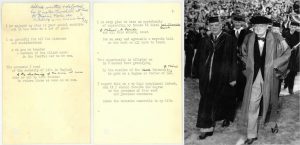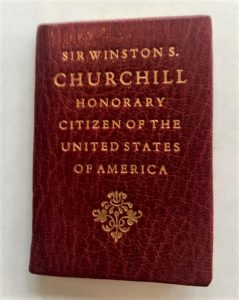Guest post by volunteer Richard Marsh, Clements Library Associates Board of Governors
Thanks to the contributions of Dr. Duane Norman Diedrich (1935-2018), the Clements Library holds selected original documents from Sir Winston Churchill (1874-1965), the great Prime Minister who led Britain during World War II (see the Churchill Collection Finding Aid). A Professor of Speech, Dr. Diedrich collected and utilized historical manuscripts in his teaching. He used documents such as original speech drafts, podium notes, and printed versions of speeches to illustrate concepts and engage students. Churchill, one of the most powerful orators of the 20th century, was a fitting subject for his acquisitions.
It may seem strange to have Churchill documents in a library devoted to Americana. However, on reflection, Sir Winston Churchill is also part of our country’s heritage. Winston was half American by birth since his mother was the beautiful Jennie Jerome from Brooklyn, New York. He was also made an honorary U.S. citizen on April 9, 1963. Today is the 56th anniversary of that event.
Congress passed an “Act to Proclaim Sir Winston Churchill Honorary Citizen of the United States of America” (88th Congress, H.R. 4374). A ceremony was held at the White House on April 9, 1963. Churchill was too old and infirm to attend so he was represented by his son Randolph and grandson Winston. President John F. Kennedy addressed 250 guests at the ceremony and said: “In the dark days and darker nights when Britain stood alone – and most men save Englishmen despaired of England’s life – he mobilized the English language and sent it into battle. The incandescent quality of his words illuminated the courage of his countrymen.” Randolph read from a letter sent by his father: “In this century of storm and tragedy I contemplate with high satisfaction the constant factor of the interwoven and upward progress of our peoples. Our comradeship and brotherhood in war were unexampled. We stood together, and because of that fact the free world now stands.”
The origin of Winston’s honorary citizenship goes back to the 1950s with Kay Halle, a Cleveland department store heiress and Washington socialite. She was a friend of both the Churchills and Kennedys. She had first met Randolph Churchill in 1932 when, as a 21 year old, he was on a U.S. speaking tour. After knowing Kay for only a few weeks, Randolph impetuously asked Kay to marry him. She wisely refused this marriage proposal from Winston’s wayward and alcoholic son.
Kay Halle first brought up the idea of honorary citizenship for Winston with President Eisenhower. However, Winston decided that the timing was not right because of the Suez Crisis, which strained U.S./British relations and resulted in the end of Anthony Eden’s premiership. However, after John Kennedy was elected President in 1960, the timing was much better. JFK enthusiastically supported Kay’s idea since Winston was JFK’s hero and he sought to emulate Winston’s oratorical skills.
As a young Harvard undergraduate, JFK had prepared a thesis entitled “Appeasement at Munich” which was highly critical of the Chamberlain appeasers and which focused on Winston’s 1936 speech regarding the “locust years”– Britain’s period of indifference and appeasement while Nazi Germany built up its war machine. Ever the promoter of the political careers of his sons, Joe Kennedy hired Arthur Krock, a New York Times columnist, to rewrite the thesis and find a publisher. Krock suggested a new title “Why England Slept,” which was an unabashed reference to Winston’s book of his 1930s speeches which had been issued in the U.S. under the title “While England Slept.” At age 23, “Why England Slept” established JFK’s writing credentials and subtly distanced himself from his father’s isolationist and defeatist views held when he was Ambassador to Great Britain during 1938-40.
JFK never had the opportunity to meet Winston during the years of his father’s ambassadorship. He met Winston face to face on only one occasion in 1958 when JFK was a young U.S. senator with presidential ambitions. Winston was vacationing on Aristotle Onassis’ yacht along the French Riviera. JFK and his wife Jackie were invited to dinner on the yacht with other guests including Gianni Agnelli, the Italian auto magnate, and William Douglas Home, a British aristocrat and friend of JFK. JFK was excited about the opportunity to meet his hero but the evening was a disappointment. The years were taking their toll on Winston; he tired easily and was often distracted. He paid very little attention to JFK and there were no memorable conversations which JFK had hoped for. After the dinner, at which JFK had worn a white dinner jacket, Jackie attempted to make light of the situation and ease her husband’s disappointment by remarking “Maybe he thought you were the waiter, Jack.” I am sure that those words did not console JFK.
Richard C. Marsh
Clements Associates Board of Governors


